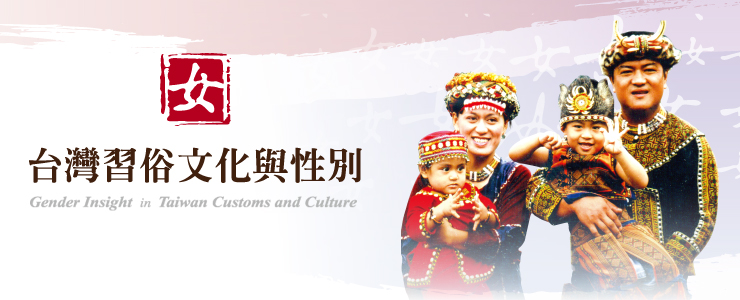
Male superiority used to be the underlying force in Taiwan’s society and culture. Gender discrimination always confines Taiwan women in customs and norms, causing them to feel oppressed or degraded. With the advance of time, long-lasting traditional beliefs and customs that deprive Taiwan women of the rights and benefits they deserve have progressed significantly. Modern society should be a free and open platform where everyone can enjoy equal development and embrace an egalitarian and diverse trend.
“Etiquette and customs must advance with time.” Understanding culture and customs that define our life is not only an essential life lesson but also a concrete foundation for promoting a culture of gender equality. The exhibition of “Gender in customs and culture” features gender culture in etiquette and customs regarding birth, marriage, worship, career development, and diverse culture. This exhibition also reflects Taiwan’s efforts and advances in promoting gender equality over the years. While propagating a new social norm, we should free ourselves from obsolescent traditions and create a new society where everyone can enjoy an equally and peacefully life.
 | Marriage Traditional weddings are sometimes filled with activities that demonstrate female inferiority, male superiority, and the society’s preference for male heirs. With the advance in time, Taiwan’s wedding practices now are moving towards a direction of fairness, openness, and diversity. Greater emphasis is on gender equality and a growing trend towards a more dynamic social structure. Weddings free from the traditional norms, gender stereotypes, and inequality—leave the newlyweds a special and memorable story upon entering the next chapter in their life. |
 | Throwing Water In traditional weddings, the bride’s mother must throw a bowl of water out of the house upon the bride’s departure to the groom’s house. This gesture is to symbolize that the bride is no longer part of her family-origin after married. However, in modern times, the bride’s parents need not consider their married daughter as an outsider. Married daughters are no longer “water spilled.” |
 | Cross a Pot Fire Upon the bride’s arrival to the groom’s family house, the bride must lift her right leg over a pot of burning charcoal placed right in front of the front door. This practice is done with the hope of bring in good fortune or cleanse any negative energy the bride may have. |

